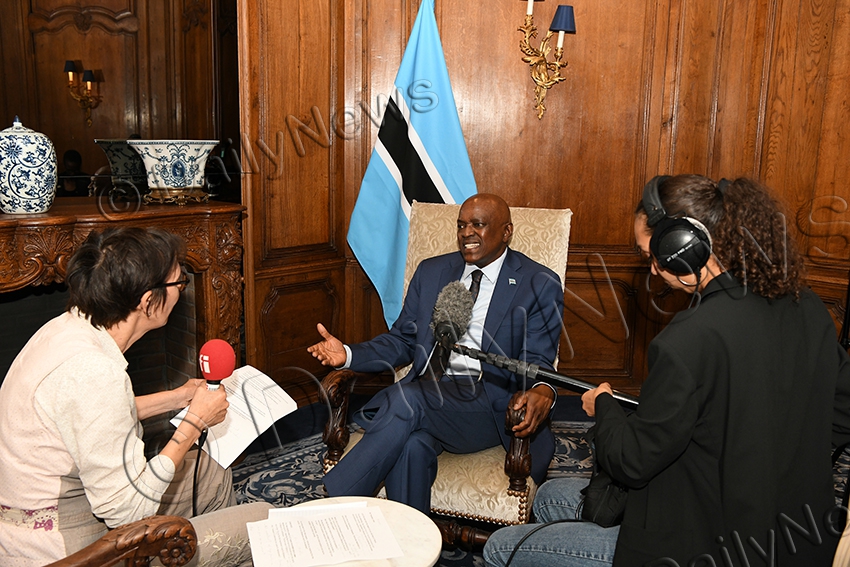Botswana aims to attain vaccine sovereignty
20 Jun 2024
The ravaging of the world by disease pandemics has made Botswana more and more intent on attaining healthy levels of vaccine sovereignty.
President Dr Mokgweetsi Masisi said this in exclusive interviews with French media houses, Jeune Afrique Media Group and Radio France International in France on Wednesday.
President Masisi said the nation’s traumatic experience with COVID-19 had reinvigorated its desire to contribute to the preservation of the world’s population by enhancing access to immunisation through venturing into vaccine manufacturing.
He told Radio France International’s Ms Alexandra Brangeon that Botswana’s presence at the launch of the Africa Vaccine Manufacturing Accelerator (AVMA) programme bore testament to the country’s determination to enter the vaccine manufacturing space, and that it also presented invaluable opportunities for strategic partnerships necessary for the actualisation of the noble aspiration.
He said access to technology and intellectual capital as well as worthy partnerships formed part of the benefits that Botswana sought to reap from its participation at the AVMA launch, adding that they would collectively translate into the launching pads that the country needed to undertake the manufacture of life-saving vaccines.
“The barrier is essentially getting the agreement to those who have the technical know-how and those who own the patents. We are not asking for a lifting of the patents; we are looking to partner and work with, and even to the extent sometimes of buying intellectual capital,” he said in response to what hurdles Botswana anticipated to encounter during the pursuit to manufacture vaccines.
He said with its rich history of good governance, Botswana was also blessed to have the institutional capacity to save others, as characterised by the existence of stable institutions, frugality in the management of resources and the accompanying efficiency of processes.
He said it was on those basis that the country would, unlike some vaccine producers, ensure equitable access to locally manufactured drugs, not only to its citizens but to those of other countries as well.
To Mr Nicholas Norbrook of Jeune Afrique Media Group’s question on what Botswana’s economy would be anchored upon once diamonds got depleted, President Masisi said the country was gradually making headway in raising a competitive human capital, an undertaking premised on the need to develop a knowledge-based economy that would serve to drive national transformation and growth.
He said while the development of a competitive human capital would be across board, the initial focus would be on sectors in which the country had a comparative advantage, among which he mentioned mining, livestock and tourism, in addition to Botswana’s capacity to excel further in governance.
President Masisi noted, however, that the persistent lack of job prospects for the bulk of the country’s people threatened the realisation of the noble intentions for a transformative growth.
On wildlife management, particularly with respect to calls by some organisations and countries for the banning of trading in wildlife trophies, he said it was astounding that none of those who supported such calls had a track-record as enchanting as Botswana’s regarding the sustainable use and management of wildlife resources.
“I also, more than anything else, would want our European friends to accept finally that we are a sovereign, independent state who are responsible in the way we manage our systems and our ecology,” he said.
He noted that Botswana had the highest number of elephants in the world and was leading in terms of the percentage of land that was set aside for legal protection of the natural habitat, including wildlife species, adding that the country was doing “better than even those who proclaim to want to do for us what we are doing much better than them.”
He said trophy hunting was one legitimate aspect of conservation as was photographic tourism, adding that both practices were acceptable as long as they were carried out in a controlled manner. ENDS
Source : BOPA
Author : Keonee Majoto
Location : PARIS
Event : Interview
Date : 20 Jun 2024







